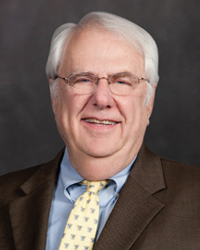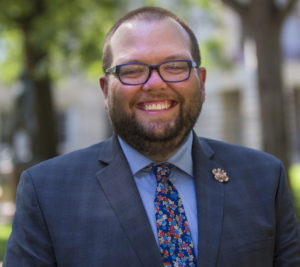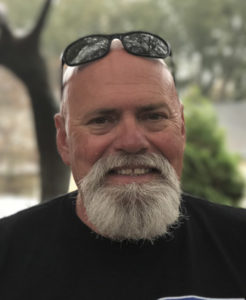By Kate Stevens. Social media plays a large role in how political candidates run their campaigns and interact with constituents and potential voters, but the online platforms also have the power to impact election results, according to local campaign experts.

Commissioner Jim Fuller
Look no further than the town of Davidson where one grassroots group with social media origins took its message to the streets.
And the polls.
The online group “Save Davidson,” which started off as a Facebook page dedicated to preserving the town’s quality of life and improving local government transparency, effectively helped oust two of three incumbents running for re-election to the town Board of Commissioners Nov. 7 and replaced them with political newcomers endorsed by the group.
The third incumbent, Board of Commissioner Jim Fuller, was endorsed by “Save Davidson” and led with 12.7 percent of the vote of the 13 commissioner candidates who ran.
“[Save Davidson] was able to pull in people who had never been a part of the political process and educate them about the things they cared about,” said Stacy Phillips, a local campaign worker and the daughter of Huntersville Commissioner Danny Phillips. “I think they ran that election.”
“I think the support from ‘Save Davidson’ was critical,” said Andy Yates, senior partner of Red Dome Group, a political consulting firm with offices in the Charlotte and Wilmington areas.
The key to the group’s success is that “Save Davidson” members initially met and organized online but then took member’s plans “offline” to turn into more of a traditional activist group, said Yates, who worked on the successful campaigns of Davidson mayoral candidate Rusty Knox and Cornelius Board of Commissioner candidate Denis Bilodeau.
Without that initial online connectivity, Yates is unsure if “Save Davidson” would have gained such momentum.

Andy Yates
“Who knows if the group would have even formed without Facebook?” said Yates.
Phillips agreed.
“They were able to organize and create this massive grassroots effort, which I don’t think ever would have been possible without social media,” said Phillips.
The group received backlash when a complaint filed with the N.C. State Board of Elections accused “Save Davidson” of being an illegally formed and unregistered political committee organization that raised money in efforts to influence the town’s election.
But “Save Davidson” co-founder Denise Beall has said the complaint is “baseless.”
The “Save Davidson” Facebook group, now with more than 2,100 online members, endorsed Knox in the mayor’s race, and Board of Commissioner challengers David Sitton, Matthew Fort and Shana Erber in the Nov. 7th election.
Business Today also endorsed Knox.
The group also encouraged voters to select Fuller and candidates Autumn Michael and Ryan Fay to round out the ballot.
Fuller received the most votes followed by Fort, Michael, Jane Campbell and Sitton who defeated Erber by only eight votes.
“Save Davidson” ended up endorsing all the winning candidates except for Campbell. Davidson Commissioner incumbents Stacey Anderson and Rodney Graham lost their seats.
Beall said she was unsure how much of an effect the group had on the election due to the large number of supporters some of the successful candidates had.
“I think we kind of pushed it over the edge,” Beall acknowledged. With 57 percent of the vote, Knox defeated long-time Davidson mayor John Woods who received only 26 percent of the vote.
Without the support of “Save Davidson,” “I think Mayor Knox would have won anyway, very likely, but not by those margins,” said Yates.
The same goes for all the winning candidates if they had not had the backing of “Save Davidson,” Yates said.
But Knox said there was such tremendous pushback in town against Woods and the unseated commissioners that Davidson residents were going to vote for Knox regardless.
“Honestly, I would have won this thing anyway,” Knox said. “I’m not going to discount the support I got from ‘Save Davidson.’ I’m not going to discount the importance of my social media presence either.”
Thirty-seven percent of the town’s registered voters came out to vote because they were unhappy with the current status quo, he said. “There was no doubt I garnered many more votes than I would have because of ‘Save Davidson’ and my social media presence but at the end of the day, it was also timing.”
Indeed, voter turnout increased in Davidson from 15 percent in the 2015 election to 37 percent in the 2017 election, according to data provided by Kristen W. Mavromatis, Mecklenburg County public information manager.

Mayor Rusty Knox
Voter turnout also increased to 20 percent in the Cornelius 2017 election up from 13 percent in the 2015 election, the data said.
Knox has relied on social media for many years for his real estate career and his musical band.
“For me, it’s free marketing,” Knox said.
He began using social media for political means when he started the “Paradise Lost” Facebook page to engage town hall and inform the public about the town’s “Catalyst Project” a now-defunct project that would have redeveloped town-owned property around South Main Street.
Utilizing social media for his political campaign came as a natural progression, he said. “I realized I could quickly garner a lot of support and interest and get the message out to a lot more people a lot more quicker through social media than any other venue.”
Social media platforms, including Facebook, Twitter, Instagram and SnapChat, have altered the way candidates conduct their campaigns and interact with constituents, Phillips said.
“Social media has changed the landscape of how elections work” said Phillips. “People now can share things as they happen, minute by minute, and they also make people more engaged because they can interact with the candidate.”
Kurt Naas, who was one of 11 candidates running for five seats on the Cornelius Board of Commissioners, used his Facebook page as a social media platform but said he preferred the old-fashioned campaign techniques of knocking on doors, fundraising and attending events to meet people.
Challenger Naas received the second-highest amount of votes after incumbent Mike Militich in the Nov. 7th election. “I think it was a secondary effect,” said Naas, of social media. “I think the voters really looked at the candidates and the campaign as a whole.”
There were negative comments made against Naas, including on the “Exit 28 Ridiculousness” Facebook page, but also plenty of people who supported him online, he said.
“I don’t know if it had any effect,” said Naas. “I just don’t know if you sway people to vote on a community Facebook page.”
Yates called the “Exit 28 Ridiculousness” Facebook page more of a “discussion forum” as opposed to a “united group,” since the page discussed not just things going on around Exit 28 on Interstate 77 but also politics and going-ons in Mooresville and neighboring towns.
Naas writes a blog called “Cornelius Corner” that he said received 10,000 hits over a three-month period prior to the election.
The blog is a good way to explain one’s position on issues that needed more in-depth analysis than a “two-sentence Facebook post,” Naas said.
Bilodeau, who is serving is first term on the Cornelius Board of Commissioners, said he also utilized a campaign web site and Facebook page because “having a presence on Facebook in today’s political marketplace or world is important.”
But, like Naas, Bilodeau preferred pounding the pavement to garner votes over spending time on social media web sites.
“I wouldn’t dismiss that it is very important but what I really enjoy and prefer is actually going out and meeting folks,” Bilodeau said. “In a town of 30,000 you can’t meet everybody but I sure darn tried.”

Discussion
No comments yet.